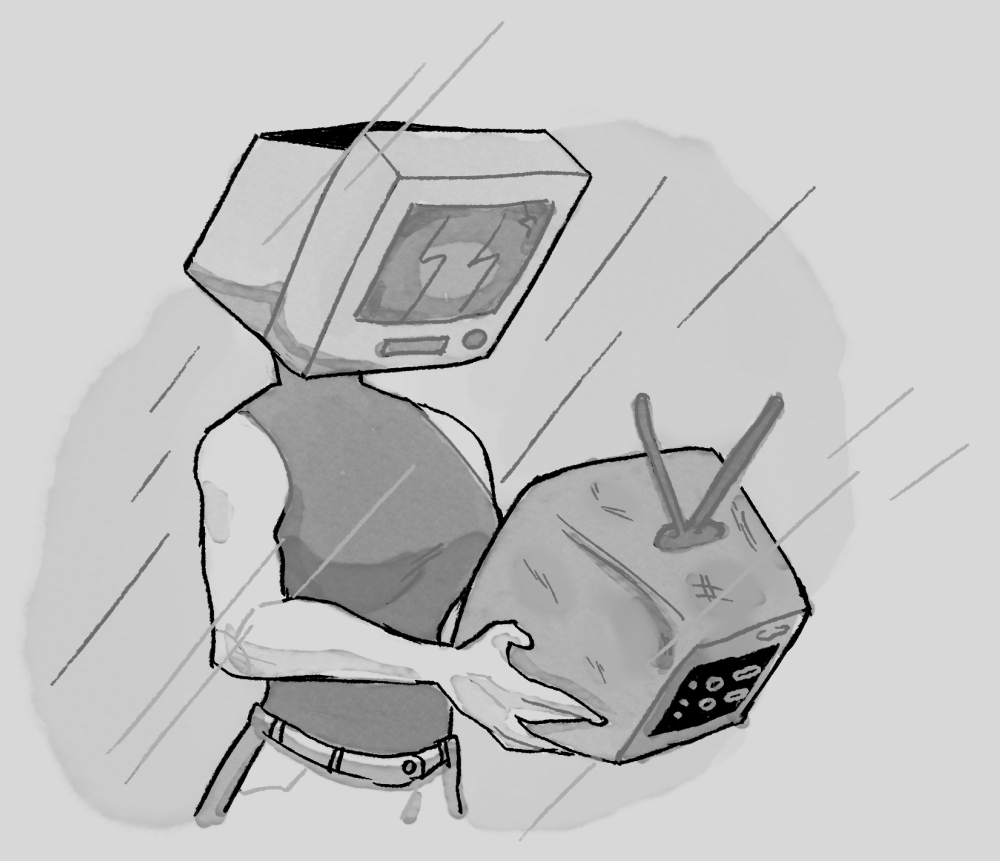The Truth of the Matter
“I lived in a glass house into which my mother could look at any time. In a glass house, however, you cannot conceal anything without giving yourself away, except by hiding it under the ground. And then you cannot see it yourself, either.”from The Drama of the Gifted Child by Alice Miller.
I have chipped away at my thoughts for a month, and it is no coincidence that September was Complex Post Traumatic Stress Disorder Awareness Month. If you didn't guess it already, that's the gist of the following article. But even that fact doesn't say much about the finer details.
Before I begin my tale, I want to state that I am taking a break from the “shoulds” in order to work on myself for a while. I shall follow my whims and my interests and do what I feel is right. I feel quite good about the future so far as I go through the process of healing. Part of that process is letting the world know the truth and admitting (to some degree) publicly what I am going through, for my own sake and for others like me. I shall become a bit more free with each following word that prints upon your screen.
You don't have to read all of this and I don't implore you to. It won't affect me much either way. Allowing it to be here at all is good enough for me. Besides, some of it may be tough. I'm not sure. It's all just memories to me, after all. Stop reading if you feel as if you can't go on—the last thing I want to do is cause more pain to exist in the world.
I ask instead that you put a little kindness in the world today as you leave this page behind, no matter how much or little you read. I hope you reserve some of that kindness for yourself.
I thank you for reading my words. Writing is the only time I feel as if I am truly me.
- monster
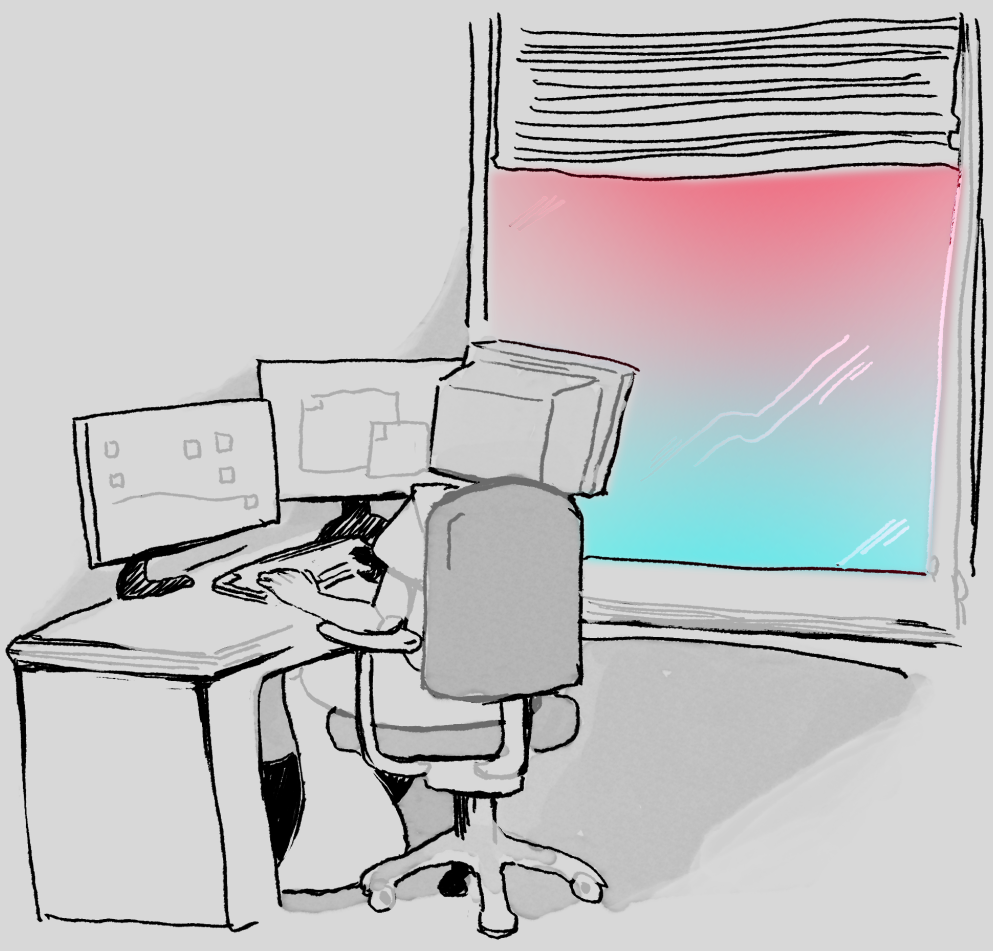
It all began when I saw students running from outside my window. I saw and heard countless police vehicles of every make and model and configuration. Then the alarm went off: active shooter on campus. My heart beat fast and I was only slightly shaky. I got under my desk, but quickly realized the window would be an issue. I immediately knew where to go.
I aimed for an internal room with no windows and a lock, and me and three others secured ourselves inside, blocking the door with a metal cabinet. We were secure, and based on the fact I could triangulate where the shooter was based on seeing the police zoom past and students running toward my location and not away, I felt secure too. I calmed myself with known facts.
I then became irrationally angry. I had messaged my loved ones, because upon seeing policeman after policeman I gossiped to them about the fact something must be happening, but quickly after that the alarm sounded and I had to hastily inform them and then make sure others I knew were aware and securing themselves. Lastly, I had to message my mother.
I remember my thoughts exactly. I texted my mother a dry text: "Active Shooter. Am safe. Do not call." She was one of the people I kept changing apps to reply to as more info came in from inside, outside, news station, online... But in reality, the only reason I messaged her is because I felt something within me say: "if I don't tell my mother, she'll try to contact me, and my phone will buzz and get me killed." It was not out of love. It was not out of obligation or necessity. It was out of fear.
I recalled years prior. There was an accident where I had gotten injured, and it resulted in me taking a trip in an ambulance. I was drained, tired, only a bit hurt after coming out of unconsciousness, and I had already contacted my partner and roommates to have someone come to the hospital. Next on the list was to send my mother a text. I told her I was fine, don't call, just wanted to let you know. I didn't want to deal with it. “It” being my mother.
I thought more about my life as I sat in that closet, angry and still and mindlessly watching news on my phone. If I was dying, who would I want at my bedside? Where would I want to be? My family is not in these macabre hypothetical scenarios. They have no place there.
But why? I wondered this, deeply, and I had been for years. I am no longer a teenager; I should have grown out of the rebellious, rage-filled confusion of puberty and self-actualization. Yet, no love remains in my heart for my own parents. Did I not mature properly? I mean, I don't really feel like an adult. To be honest, I don't even really feel like a person sometimes. Was there something wrong with me?
Eventually, we were allowed to leave campus, and I came home. I had written about it previously in an article about the shooting itself, (which you can find: HERE) but here's a behind-the-scenes. The following paragraph is from the aforementioned article:
And then, for example, you go home. You're safe, and you get to go home. You are sitting at home on a couch after sitting for four hours on the ground in what is essentially a closet. Your back already hurts from a previous injury, but you suppose it is preferable to being shot—of course! You watch a broadcast of the press conference, which has gone live only 30 minutes after you get home safely. You learn things about what just happened. You observe. Someone texts you as they watch it too, living hours and hours away from the city. "So sorry this happened to you," they say, "it's something you will never forget." Said as if this were a once-in-a-lifetime trip to fucking Disney World.
Those last few lines where I quoted someone—that was my mother. This was exactly what I experienced once I was "free" of being under lock-down. I ate dinner with my partner and my friend, I watched the news, and I read my family's words as they told me: "oh well!"
Let me return to that accident I had mentioned: I was in the ambulance, and then the hospital, and then I went through a period of trying to heal where part of it was processing some complex, difficult feelings. The next time my parents came to visit me, they didn't even ask how I was. I don't even remember if they mentioned it without me bringing it up. They sure did let me know how terrible they were doing, though.
Even earlier in my life, when I was barely in college, little red bumps and patches appeared on my arm. "Oh," my mother had said, barely looking, "that's always been there. Your skin is just like that."
While I was a teenager eating a burger with my parents in public, my jaw locked up. It wouldn't close. That didn't warrant a trip to any doctor of any sort. Years later, I am an adult with my own job and insurance and I find that I have arthritis in my TMJ from some sort of trauma.
"Wow," my mother replied, "I have no idea what could have caused that. Oh! I forgot to tell you, your aunt has cancer again..."
Some part of me forgives these little transgressions, because, well, maybe they understood that I didn't want their opinions or affection. But why? How did we get to that point?
I am surrounded by people who supposedly love me and support me, yet I feel alone and scared. Most of the time, even when I'm enjoying myself (I think I am, at least; am I enjoying myself? I tell myself I do...), I feel as if I am not a part of the world. More often it feels as if I am a cameraman for a television series, recording the world around me for someone else. I am the 4th wall. I am not here. I am merely watching.
As a child, I remember daydreaming in my middle school classroom, as I so often did. I was teary. I wished to feel normal, and have friends who cared about—even just one. There must have been something wrong with me. I had dreamt that some secret service agents came into our class to explain that I was an experiment: a robot secretly among humans. The men in black would tell the children to treat me well, now, for she is precious cargo. Alas, no one would ever come for me.
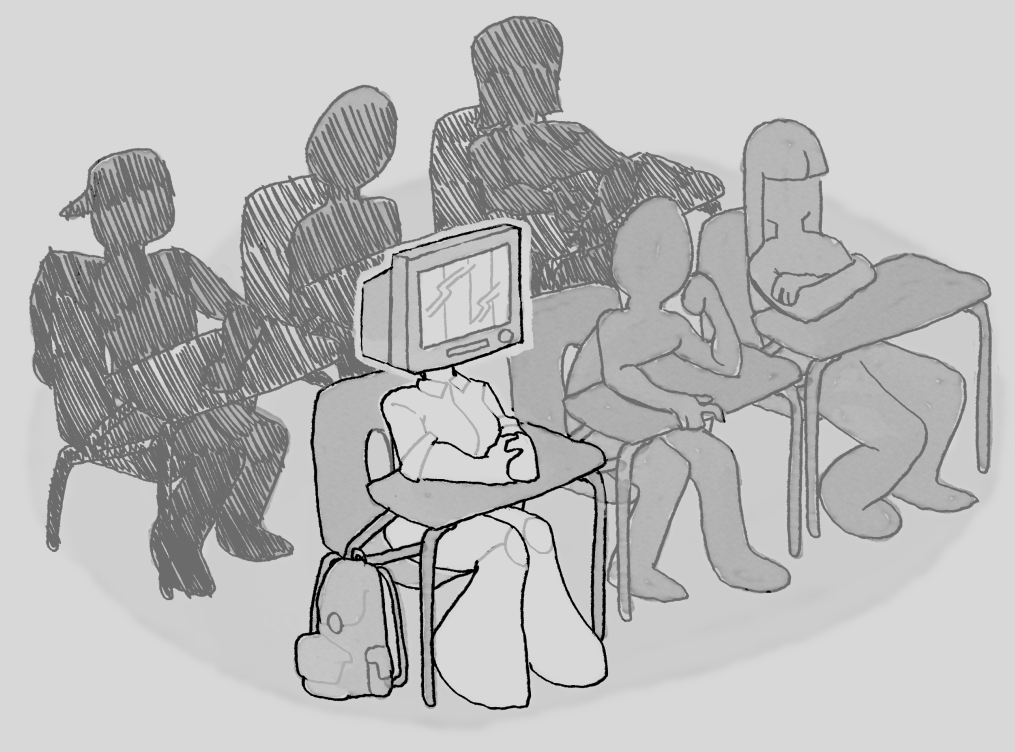
Impetus
I started seeing a therapist again recently. I told her, truthfully, what I felt: I've been feeling listless and disconnected and my family felt oppressive to me. They were annoyances to get past, just barriers to... something... rather than treasured relatives, relationships, people I spent twenty-odd years of my life with. I felt dread having to "deal" with the unspoken obligations.
"You also mentioned you were in a mass shooting recently in your paperwork," my therapist pointed out, "how do you feel about that?"
"Ah, well," I began, "I'm very anxious usually, so when the alarm went off, I was ready and felt pretty secure and knew what to do, you know?"
The therapist was quiet, and brought a manual into their lap. "I'd like to talk to you about PTSD," they said, "typically, someone with anxiety begins to panic and not think straight in a situation like that. What you're describing is hypervigilance. It's like how a soldier comes back from war, and it's what they're used to, so when a situation like that happens, they're ready because they're always scanning for a threat."
Oh. I began to nervously laugh. Something within me began to release as if the therapist had popped me open like a soda and the fizz was beginning to bubble. Indirectly, the therapist has said: you weren’t hurt by this—you already had been damaged.
I followed, answering as the therapist asked me questions. I was sheepish at first. There was some "logical" part of me that did not believe her saying I might have PTSD. Nothing had happened to me.
"You had wrote that you're really bothered by your mother talking about her illness," the therapist said. Yes, I had wrote in my intake forms about how my mother kept insisting she update me on how horrible her cancer experience was going. I described her as an emotional trash can.
I then brought up an event that I shall not detail here, but I described how it really terrified me, even though I was not hurt physically. It is unsafe to sleep in my childhood home, and I refuse to sleep in that damned place ever again, especially since there weren’t any locks on the doors. Suffice to say, that's a clear sign of something wrong. My therapist listened and agreed.
"You qualify for all the ways to satisfy requirement A," the therapist said. "Let's move on for now."
I began to laugh nervously more. All of them? I listened to the next inquires and thought intensely.
"I don't have nightmares often," I admitted, "I tend to dream a lot of wild things and even if "scary,” it tends to be peaceful and entertaining. But, the dreams where I wake up and my heart's pounding and I'm really bothered by them as if they were real and just happened...? Well, they're usually about my parents. Does that count?" The therapist nodded.
Continuing on, I was asked questions and each time my mind wandered instantly into scenarios that involved my parents. I avoided my parents in every conceivable way, and eventually avoided my childhood home and the environments akin to it. I hated myself and was untrusting and fearful of authority figures. I was constantly feeling guilty, fearful, angry, ashamed, or sad. I didn't want to be fully present. I felt detached from others. I felt as if I was "emotionally constipated" as I often say, where there is something deep within me, but I have no ability to let it out.
I acknowledged—without hesitation—that I was very hypervigilant, had an exaggerated startle response, concentration problems, and sleep disturbances.
The final discussion was about dissociating. I hadn’t really related to any descriptions of dissociation before, but the therapist explained the two types. I realized I had only ever heard of derealization, where the surrounding world feels fake, as if it were a dream or you were separated from it all by glass. What I experienced was depersonalization: the world was very real to me, but I didn’t feel as if I was.
A kindly intern, new on set, had just acknowledged the existence of the underappreciated cameraman.
All along, I had been traumatized. I was diagnosed with PTSD. It felt right. Yet, now, the question to solve was: how did I get here?
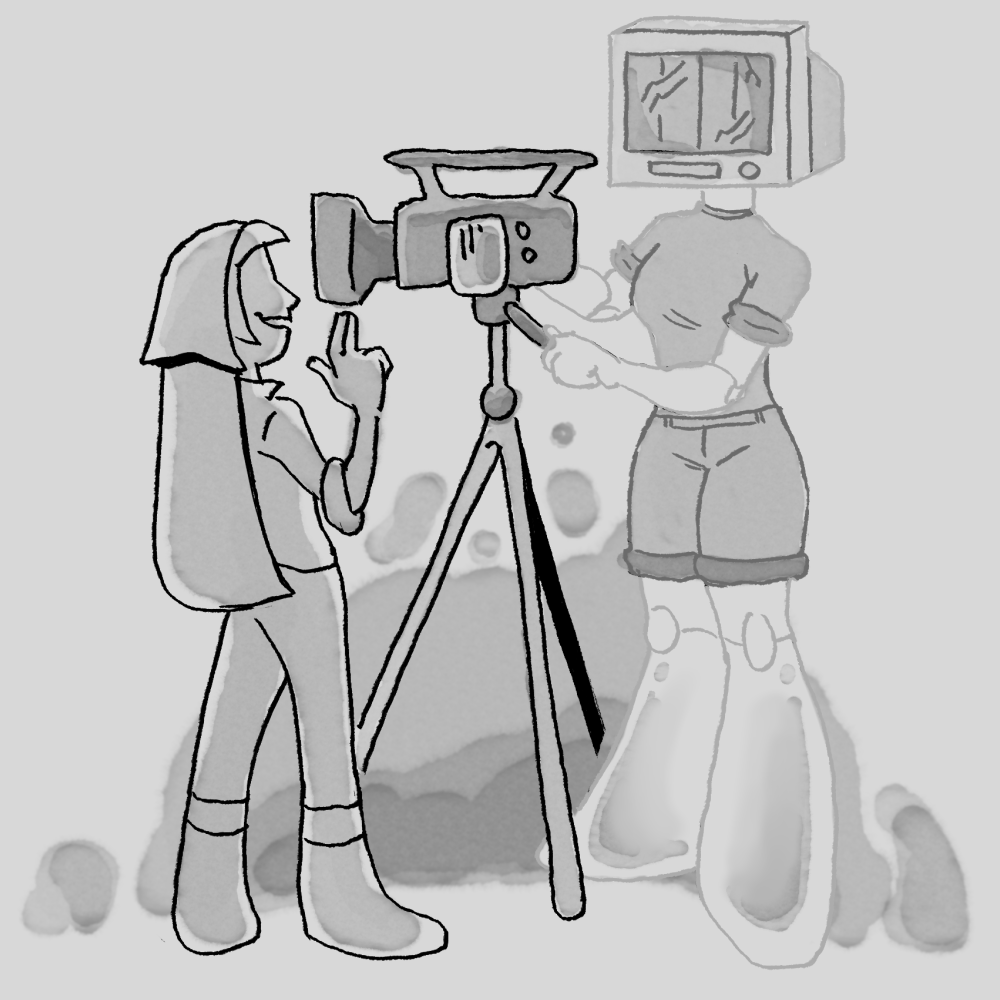
A Normal Life
As a baby, I apparently never cried. I was a boon to every restaurant-goer who is traumatized by a loud, unsatisfied infant who ruins a nice evening out. Because of this, my mother proudly told me and many others during small talk that my “goodness” was the reason I was an only child; if they were to have another, my younger sibling would have surely been born the devil, the Antichrist.
I do not remember much of my childhood, to be frank. It comes to me when things rhyme—when I recognize that I've felt something similar before. Then, when that happens, I write it down in a journal I keep. I think of it as a memory bank, so that I know that I'm not just going "crazy" when I feel as if it's not so bad. It is that bad.
Now, I have a question for you. How does a child know what normal is? Who is normal? What is normal?
The truth is that normal can not exist because there is no rule-book that is sent to every new parent that instructs them on how to be a normal family. There's averages, and there's things that are usual, healthy, and expected—but there is no normal.
A child is born innocent and ignorant of the goings-on of the world. Whatever their caregiver is, does, or says is what they know. Their home is their world, as is their neighborhood, their town, or whatever surroundings they have. There are plenty horrid examples of extremely abusive parents who lock their children away just like in Flowers in the Attic. In situations like that that we know of, the child victims are usually malnourished, don’t know what “normal” everyday objects are, and in some extreme cases, they’re branded feral for never having enough interaction with others to properly develop necessary skills to function. A child succumbs to what environment they are born into, with little or no control over it, and even with modern mass-communication comforts, they cannot truly know what is "abnormal."
As for me, knowing this truth makes me feel more “normal” to have felt the rage of teenage rebellion. It feels only right—of course!—that I have begun to awake to my true self only now that I have reached adulthood. I have witnessed the possibilities of what could be and what truly exists out in the wide open world, and in doing so, I have rejected the notion that the first twenty years of my life were normal at all. They weren’t! They shouldn’t be, ever, for anyone; no one should go through the things I have.
I developed a strong existential depression at the age of ten. Somehow, and I do not know why, I knew that my life was sad and lonely, though I didn’t have the language to express it to anyone, nor did I show any “concerning” symptoms aside from being sad—oh, and I was lazy, as parents so often describe their children. I look back at this fact—the fact that any prepubescent child could feel such despair—and I am angry at it. It was the first sign of a reaction to a life that was not normal.
The next signs were around the age of sixteen, give or take. I had suddenly realized one day that I was extremely constipated and thereafter often struck with excruciating abdominal pains. Everyone dismissed the symptoms as my fault. I didn't do this, I didn't eat that... So I tried everything. Nothing helped. I believed that I had ruined myself somehow; it was all my fault.
I recall countless times that I cried myself to sleep, rocking my own body as if I were being held by a kindly, soft caregiver. I was completely alone. I should have been grateful that my basic survival needs were met, but still, none were met that allowed me to thrive.
Before I finally decided to pursue a degree, my mother was diagnosed with cancer. She almost refused to tell me. Her despair filled the home. I went to my own room and sat alone. My first thought right after she told me was not sympathy for an ill woman, it was despair for myself. I would be neglected in my needs further, always second to the needs of the matriarch, whose every beck and call I was forced to answer to. I thought to myself that I must have been truly evil, cruel, and wicked to have so much hatred in my heart for the woman who raised me. Towards a woman with cancer.
The feelings of repulsion only increase after I was the only capable one to be her caretaker while she was at her weakest. It was traumatizing; I don’t feel an ounce of guilt admitting that. It was so disgusting and repulsive the things she made me do that I vomited on the floor of the bathroom one night. I hated myself even more, for I was weak. I had no love for my mother. I had no sympathy for a fellow human being.
University was my escape. I didn't even finish a year before I had to return home for the COVID-19 Pandemic.
That period of time was intolerable for me. My parents both did not care if they lived or died and therefore were dismissive and carefree towards any safety precaution. I tried to follow the rules but it was impossible if my parents did not care. I feared them for their carelessness. I was terrified of them. I feared that I would die painfully among people who I hated, and that my true self would never see the light of day.
I fought back in desperation by getting a therapist, but it was during that time when I first realized change was hopeless. I had tried to tell my mother that she did something objectively wrong. She deflected and gave excuses to her behavior. I made her cry. I didn’t feel a thing as she ran to her room to loudly sob for hours, all because I had told her it wasn’t okay to claim that I was trying to hurt her... because I accidentally hit a pothole while learning how to drive.
Never once did I consider myself abused. I was never hit or anything, and I mean, I wasn’t yelled at for no reason! If I was punished, it was always my fault because I’d done something wrong. The pain was from a thousand little things that a person could easily forget about. The problem was that I was a child, and my entire childhood was spent experiencing a thousand tiny fear-inducing punishments. When I was an adult, I realized I felt healthiest when I was separated from my family. Each time I returned for holidays, the pains returned tenfold. The healing I’d done was erased.
I moved far, far away from them and somehow still felt smothered. I feared my parents. I feared that my only escape from family obligations was to wait for them to eventually die. Even then, I could no longer handle the panic attacks because I didn’t reply to a random, causal text message within thirty minutes. I’m an adult with my own life! I am free to make my own choices! The next choice I had to make was to never speak to them again.
The last time I saw my mother, we were out and about, and I did a silly fortune-telling machine. It was one of those with an animatronic and a voice and it printed you a ticket with what’s essentially a horoscope and some lucky lotto numbers on it. That day, when my partner and I were alone at home, I read it out loud:
A dark haired person who is trying to harm you will soon disappear from your life and you will be extremely happy.
I began to cry—sob. A hearty sob that felt relieving to the soul.
I’m not superstitious, but I still acknowledge the lovely serendipities of certain events, where the bodymind sends out a signal of recognition. Strong emotions flow through you because something crossed your path, and that’s important to notice in yourself. I recognize that I read this little ticket with some vague statement on it and I burst out in tears. I heard (even if from the heartless, uncaring void) an affirmation that my pain would end, and I desperately wanted that so badly that I believed in the magic of it. I read that sentence and knew it was my own mother.
My mind may not agree, but my body does: it was not out of nowhere that I abandoned my family.
The Eggs
I probably wouldn’t tell someone that I was abused. Perhaps I should, to bring awareness to the more clandestine ways a person can damage and neglect a child, but I still hesitate to admit I count. Besides, if I told someone I was abused, they’d think of something much different than what I actually experienced, based on how pop culture depicts child abuse.
Yet there are a few things that haunt me that I consider irredeemable. I have to. I will not disrespect a child by dismissing these horrors.
One of the worst instances involved eggs.
I remember it like a dream. It was one of those unpredictable, one-off events. I often had to gauge my mother's mood if I wanted to ask for something. If she was feeling kindly, she'd be reasonable. If not...
We'd just gone for groceries. I was a young, prepubescent child. I had to help carry the bags in. I accidentally dropped the bag with the carton of eggs. Or, maybe I clumsily knocked them into a wall or some hard surface (I am quite clumsy). I don't know exactly what I did but I know the punishment.
The eggs were broken. My mother looked at me with a piercing, bloodthirsty look in her eyes. I don't know how she was feeling that day, but it was clearly wasn't good. She took me and the groceries to the kitchen and sat us all down at the counter. She took the shattered eggs and cooked them. Terribly. On purpose. It was punishment for my transgression; I broke it, I brought it.
It was the most disgusting thing I ever ate. She force-fed me all dozen of them. They were over-salted and over-peppered. They were full of crunchy shell shards. It was as if through breaking them I had made them putrid and rotten.
People oft describe their situations as "walking on eggshells". Well, I had to eat them.
I still don't know why she'd do that to me. I don't know why anyone would do that. It was just eggs. They break all the time. I certainly never broke them again, so I guess it worked somehow. But here's the thing: I don't even remember if the punishment was remotely warranted. I don't remember what I did, how I acted, what I said... I just remember the torture. I just remember the tears and my fear. That's not discipline or education, that's a display of power—a hierarchy. I knew my place, and it was one that did not deserve respect.
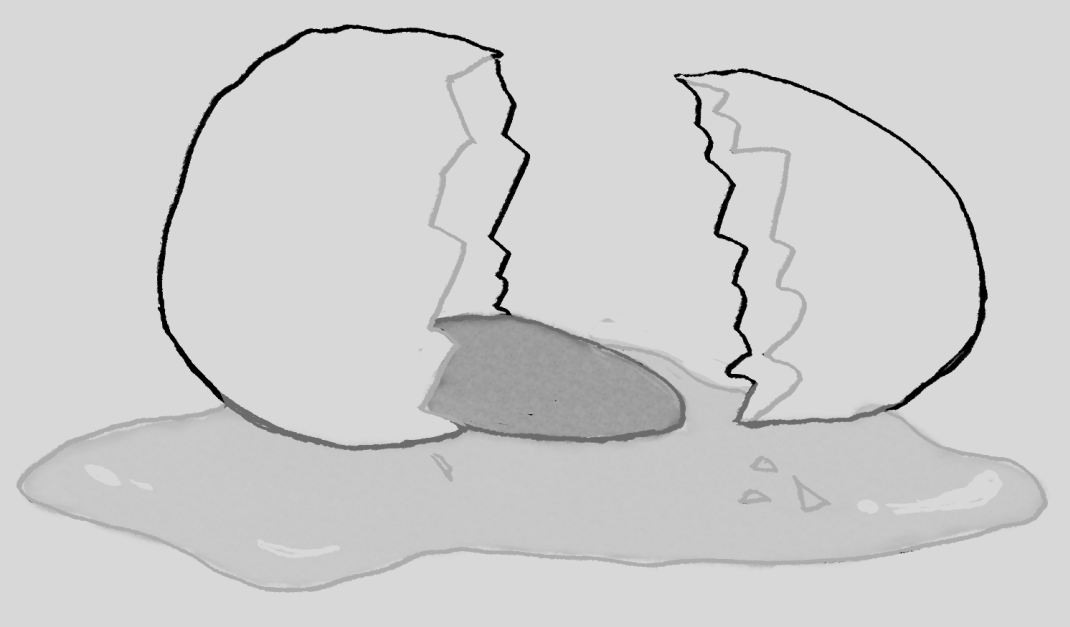
Into the Trashcan
My parents were often the biggest bullies I knew. They were childish, immature, ruthless, and always right. They trained me well, to think what was wrong was normal. Nothing about me—about us—was normal.
I had to listen to my parents talk about horrible gossip and graphic adult topics in public while they ate out with their friends. It was fine, though, I was just a tag-along. I had my Nintendo DS to play. It didn’t matter that my ears still worked.
My mother—and I realize this now—often used me as a confidant. I was a child. Who was I to tell the person who fed me, housed me, drove me around, clothed me, et cetera that I was not in the mood or had energy to listen to her—if you'd excuse my vulgarity in this moment—bitch and whine constantly?
Actually, scratch that last line. I don't excuse my fucking vulgarity. I deserve to be mad.
I do think the most apt description was that I was an emotional trashcan, and no one ever seemed to replace the bag. I was overflowing with trash and rage and irritation and a shrill voice that makes your entire soul feel like nails on a chalkboard. I was at the mercy of my caretakers to listen. It was an obligation. After all, I did love them, didn’t I?
My mother would point out a piece of clothing she'd thought was me in the store. I didn't like it most of the time, which was fine—we were generations apart and had different tastes. We could move on. Yet, each time without fail, my mother would whine that the only reason I didn’t like it was because she liked it. I was just a bratty teenager who was rebellious against their parents. Sure, maybe that was true—but it certainly wasn’t because I didn’t like godawful floral prints at Macy’s or whatever.
Now I know these instances as examples of enmeshment. I had to hold on to emotional baggage for my mother and mirror her personality in order for her to feel a little less alone and unloved. I had to listen to her threaten competition and/or my own father (that one being particularly hard since I related to him more). I had to like what she liked, and if I didn’t, there was something obviously wrong with me.
There was a specific, small little thing I recall. I had an adage I quite liked and would tell myself, which my mother eventually co-opted. The issue was, I eventually noticed the flaws in the adage and adjusted it, developed it further into my personal mantra. My mother kept using the old version and smiling as she admitted she thought of it herself. She didn't. I didn't either, all things considered—but I was the one who had used it around her before she ever said it herself.
What my mother chose to remember and assign to me or as reality was very distressing. It was confusing and disorienting to truly know your true self and then have one of your most trusted authority figures say: Oh no—I remember you saying you loved Paris, France! Don’t you still want to move to Paris? I think it would be lovely to live in Paris...
...but I don’t ever remember saying that I wanted to live in Paris.
"Don't call yourself Cinderella!"
Worst of all, the part I hate remembering the most, is how often my mother would guilt me into giving her massages.
It happened so much that I recall making a mistake on one of my spelling lists in elementary school: for homework, we had to write a sentence using each of our words. One of the words was "message." Being a young child as I was, I confused it with massage and wrote a sentence about how often I'd massage my mother's back.
It was a repulsive experience that would leave my hands feeling numb, as if a thousand needles had rendered them unusable. It was leathery and scratchy and made my joints ache. If I protested, though, I didn't love her. Well, I didn't; very quickly I learned I hated that woman. I was magnetically repulsed by her! Yet, still, I needed a mother, so I continued...
You Shouldn’t Need to Ever Say That
Once, I recall looking at my mother in fear after she yelled at me. I don't even know what about. All I do remember was her response: "Oh, don't look at me like that. I don't abuse you."
Childish Acts
I ordered a children's movie on Netflix once—back when it was a DVD delivery service and not just a streaming platform. My parents saw it and laughed. They ganged up together and bullied me. They laughed to tears. Why? I wondered... Why? It was not porn, or violence, or hateful or gross or bad or hurting anyone if I watched a little animated movie. Why laugh at your own child for that? I don't know.
I never ended up watching it. In shame, I slipped the disc back into the sleeve and shipped it off. I was disgusted with myself.
Clearly, there was something wrong with me.
I could never get it right.
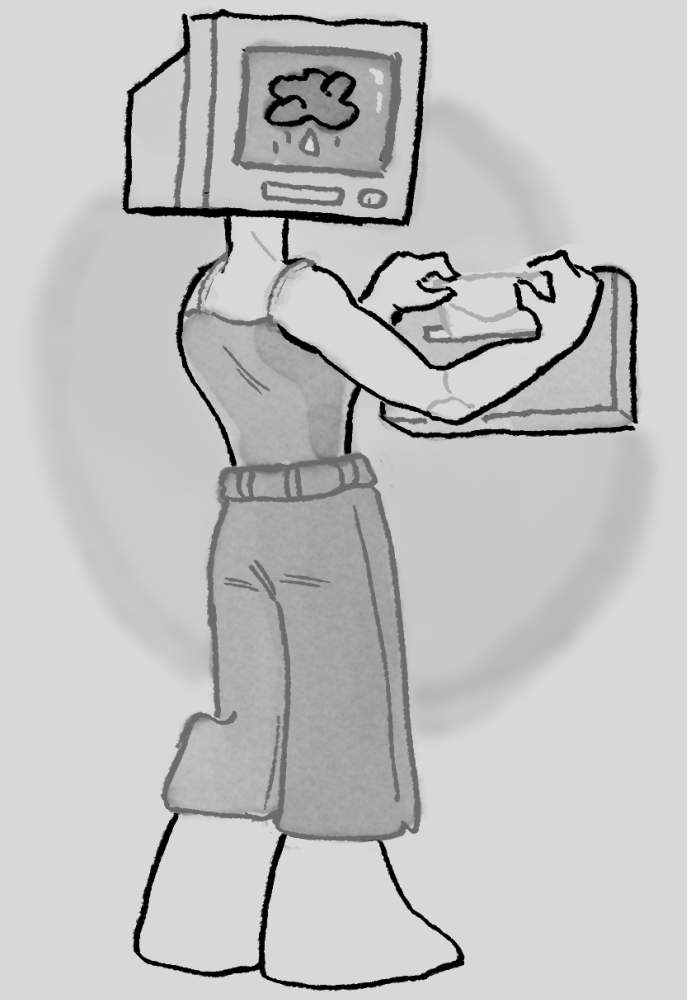
In the End...
In order to fight against my horrid, dysfunctional childhood, I also have to accept that I can’t please everyone. I came to my senses when I realized that I couldn’t imagine a scenario where I would choose my parents over my friends, my loved ones, or even a fairly new acquaintance I’ve taken a liking to. In that same vein, I’ve accepted my life story. I have committed a faux-pas toward the gravely ill, the voyeurs of inspiration porn, respecting thy elders, and the fans of traditional families. I accept that many people will think I’m a terrible person for choosing to be an orphan, to abandon my family, and for not being able to feel sympathy for my old, disabled parents. I’m fine with that. My community is with those who understand, and there’s a lot more of us out there than I wish.
I don't wish my mother a happy mother's day. I don't remember my parents' birthdays. I don't ever speak to them.
They do not speak to me.
They do not use my true name. They do not remember what I do for work. They don't remember what I got a degree in. They know the bottom of a beer mug and their pain they've carried since they were my age and from before then too. They continue on as they've always been—perhaps even worse than they've always been. They expect things of me, but don't like when I expect things of them in return.
The truth of the matter is I hate my parents and they have hurt me beyond repair. I think that’s an okay thing to say, because it's not okay that a child had to grow up like I did.
Despite that... it's still hard. There are days when I forget—and it's not a blessing to forget, sadly—I forget and I begin to wonder if it's all an overreaction. I wonder if I'm the bad guy. I wonder if I truly am the one that's been wrong my entire life. Maybe I was the devil child my parents feared they’d bore, not an angel. When I forget, I am left with an emptiness that says, “you are no different than a broken television abandoned to the curb: left in solitude until someone comes to take you away to elsewhere—a land unnamed because they didn’t even bother with caring where you end up.”
Well.
It's a good thing that I like broken things.
